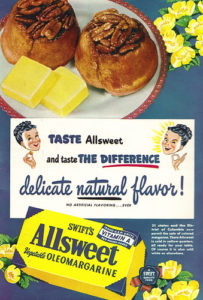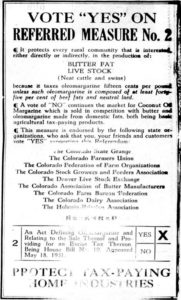by Julie Pelegrin
This year’s statewide ballot promises to be action-packed with initiatives and referred measures—11 in all. But only one of the ballot measures is actually historic: Proposition 113 (aka Senate Bill 19-042), an act concerning adoption of an agreement among the states to elect the President of the United States by national popular vote. It’s not historic because of its content (although changing how we elect presidents and vice presidents would arguably be significant), it’s historic because of the path it took to get on the ballot.
Long-time LegiSource readers will remember that in 1911, the people of Colorado amended article V, section 1 of the state constitution to reserve to themselves the power of referendum. This means that, if a bill passes without a safety clause, an individual may collect signatures[1] on a petition to place all or a portion of the bill on the ballot for voter approval. Senate Bill 19-042 passed February 21, 2019, without a safety clause. The governor signed the bill, and by August 1, 2019, two citizens submitted a petition to the Secretary of State’s office with enough signatures to put the entire act on the ballot. The last time the people referred an act to the ballot was 1931—and therein lies a tale.
 The Twenty-eighth Colorado General Assembly convened its regular legislative session Wednesday, January 7, 1931. The state and the nation were still in the early years of what’s now known as the Great Depression. About a week into the session, Representative Joe Plummer, a farmer representing Morgan and Washington counties, introduced House Bill 10 (HB10), “A Bill for an Act Regulating the Manufacturing, Selling, Handling or Dealing in Oleomargarine, Imitation or Filled Cheese, or Any Substitute for Any Dairy Products, Requiring Licenses Therefor, ….”
The Twenty-eighth Colorado General Assembly convened its regular legislative session Wednesday, January 7, 1931. The state and the nation were still in the early years of what’s now known as the Great Depression. About a week into the session, Representative Joe Plummer, a farmer representing Morgan and Washington counties, introduced House Bill 10 (HB10), “A Bill for an Act Regulating the Manufacturing, Selling, Handling or Dealing in Oleomargarine, Imitation or Filled Cheese, or Any Substitute for Any Dairy Products, Requiring Licenses Therefor, ….”
These days the concept of “oleomargarine” requires some explanation. Margarine was created in France in 1869. Emperor Louis Napoleon III offered a prize to whomever could invent a “cheap edible fat” to feed the military and the lower classes. Although it started as a mix of animal fats, by the early 20th century, oleomargarine was mainly made from vegetable oils (oleo comes from the Latin oleum, “oil”) and soon it was widely available as a low-cost alternative to butter. And that caught the attention of the dairy industry.
The industry supported several state and federal laws against oleomargarine, mainly to tax it and prohibit the addition of coloring. (Oleomargarine is naturally colored an unappetizing white; margarine comes from the Greek word for “pearl.”) HB10 as introduced would have made selling oleomargarine without a license unlawful, and the licensing fees weren’t cheap. The bill also prohibited making or selling oleomargarine that was colored and flavored in imitation of real butter. According to Western Farm Life magazine, the “obvious” object of the bill was to “benefit and protect the dairy farmer,” and the magazine urged the agricultural interests of the state to support the bill by writing to their legislators.[2]
But not everyone was so pleased. According to the Steamboat Pilot, the bill ignited a “vigorous fight” between the range cattlemen and dairy cattlemen. The oleomargarine made in Colorado included beef tallow. The range cattlemen claimed the licensing requirements would reduce the market for oleomargarine, and thus tallow, thereby reducing the price of cattle by about six dollars per head.[3]
Despite the vigorous fight, the bill enjoyed a pretty smooth ride in the House. HB10 passed on third reading February 24 with 52 aye votes. Fifty members of the House then voted to add a safety clause.[4]
The ride was much bumpier in the Senate. First, the bill stalled in committee for over a month. When a motion to move the bill out of committee was tabled, one newspaper columnist reported, “That just about kills it.”[5] Eventually a deal was cut, and on April 2, the committee recommended the bill to the Committee of the Whole with significant amendments, including adding an excise tax on oleomargarine of 15 cents per pound. The Committee of the Whole rejected the committee report and instead adopted an amendment replacing the text of the entire bill, retaining the 15 cent tax, but exempting oleomargarine that contained more than 30% of animal fats. The bill weathered several additional attempts to amend and kill the bill, finally passing third reading in the Senate with 28 ayes. But the safety clause was removed.
The House promptly rejected the Senate amendments. The conference committee again rewrote the entire bill, and both houses finally passed the bill on the last day of session. In its final form, the bill, included a 15 cent per pound tax on oleomargarine containing less than 45% animal fat, required manufacturers and wholesalers to pay an annual $25 license fee, required restaurants that served oleomargarine to post a sign to that effect, and did not have a safety clause.
But all was not well. According to some news reports, the “nut oil interests” (the other oil used in oleomargarine) were not happy about the  tax.[6] But one columnist continued to claim that it was the dairy farmers and cattlemen who were still at odds.[7] By July 22, the citizens had referred HB10 to the ballot. And, despite endorsements by several agricultural interests and recommendations for passage in several rural newspapers, HB10 failed with 217,671 no votes to 134,313 yes votes.
tax.[6] But one columnist continued to claim that it was the dairy farmers and cattlemen who were still at odds.[7] By July 22, the citizens had referred HB10 to the ballot. And, despite endorsements by several agricultural interests and recommendations for passage in several rural newspapers, HB10 failed with 217,671 no votes to 134,313 yes votes.
And one would think that was the end of it. But it wasn’t.
About two weeks after the Twenty-ninth General Assembly convened in January 1933, Representative Joe Jankovsky[8] introduced House Bill 337 (HB337), “A Bill for an Act Defining Oleomargarine and Relating to the Sale and Distribution Thereof and Providing for an Excise Tax Thereon.”[9] Before it passed the Senate, at least one newspaper editorial referred to the General Assembly’s action on the bill as “discouraging and disgusting.” The editorial went on to ask, “How in the world can we have decent, efficient government when legislators, elected to represent the people turn right around and deliberately do the thing the people have said shall not be done.”[10]
HB337 as introduced looked a lot like HB10, but by the time it passed there were three important differences: 1) The excise tax was reduced to ten cents per pound; 2) the tax exemption applied to oleomargarine made from any of a variety of listed fats (all of which appear to be domestic in origin); and 3) the bill had a safety clause. And the final interesting twist to this story: The only reference in the journals to a vote on the safety clause is in the House, where it failed. There is no other indication in the House or Senate Journals that the safety clause was approved by a two-thirds vote, which appears to have been the practice at the time.
So, November 3, 2020, Colorado voters will decide the fate of Senate Bill 19-042. If the measure fails at the ballot, history demonstrates that the question of Colorado’s participation in the national popular vote compact could be revived for consideration by a later General Assembly.
[1] This year the minimum required number of signatures is 124,632.
[2] “Legislation in Interest of Farmers,” The Western Farm Life (for Irrigation, High Altitude, Plains Farmers), as reproduced in the Record Journal of Douglas County, February 20, 1931.
[3] Alva A. Swain, Under the Capitol Dome, the Steamboat Pilot, February 6, 1931.
[4] Based on a review of the House and Senate journals from that time, it appears that once a bill passed third reading, the body – House or Senate – would consider a motion to add a safety clause to a bill. The motion required at least a two-thirds majority to pass.
[5] Alva A. Swain, Under the Capitol Dome, the Steamboat Pilot, March 27, 1931.
[6] “Dairy Interests Contend Margarine Bill Should Pass,” the Independent, Vol. XLV, No. 48, Oct. 28, 1932.
[7] Alva A. Swain, Under the Capitol Dome, the Wray Gazette, Vol. 30, No. 42, Oct. 13, 1932.
[8] Rep. Plummer was not reelected in 1932.
[9] The final title of HB10 was “An Act Defining Oleomargarine and Relating to the Sale thereof and Providing for an Excise Tax Thereon.”
[10] Oak Creek Times, reprinting from the Lamar Register, page 4, March 30, 1933.
